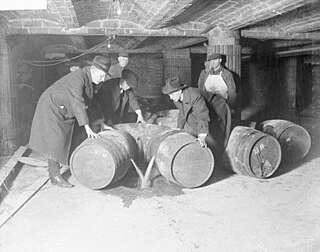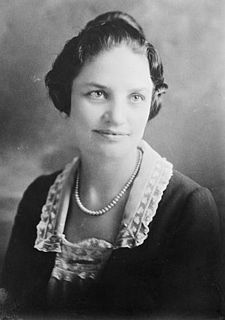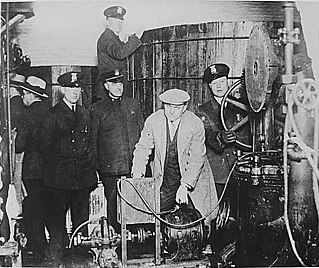
The Eighteenth Amendment of the United States Constitution established the prohibition of alcohol in the United States. The amendment was proposed by Congress on December 18, 1917, and was ratified by the requisite number of states on January 16, 1919. The Eighteenth Amendment was repealed by the Twenty-first Amendment on December 5, 1933. It is the only amendment to be repealed.

The Twenty-first Amendment to the United States Constitution repealed the Eighteenth Amendment to the United States Constitution, which had mandated nationwide prohibition on alcohol. The Twenty-first Amendment was proposed by the 72nd Congress on February 20, 1933, and was ratified by the requisite number of states on December 5, 1933. It is unique among the 27 amendments of the U.S. Constitution for being the only one to repeal a prior amendment, as well as being the only amendment to have been ratified by state ratifying conventions.
Pollock v. Farmers' Loan & Trust Company, 157 U.S. 429 (1895), affirmed on rehearing, 158 U.S. 601 (1895), was a landmark case of the Supreme Court of the United States. In a 5-to-4 decision, the Supreme Court struck down the income tax imposed by the Wilson–Gorman Tariff Act for being an unapportioned direct tax. The decision was superseded in 1913 by the Sixteenth Amendment to the United States Constitution, which allows Congress to levy income taxes without apportioning them among the states.
Brushaber v. Union Pacific Railroad Co., 240 U.S. 1 (1916), was a landmark United States Supreme Court case in which the Court upheld the validity of a tax statute called the Revenue Act of 1913, also known as the Tariff Act, Ch. 16, 38 Stat. 166, enacted pursuant to Article I, section 8, clause 1 of, and the Sixteenth Amendment to, the United States Constitution, allowing a federal income tax. The Sixteenth Amendment had been ratified earlier in 1913. The Revenue Act of 1913 imposed income taxes that were not apportioned among the states according to each state's population.

The Bureau of Prohibition was the federal law enforcement agency formed to enforce the National Prohibition Act of 1919, commonly known as the Volstead Act, which elaborated upon the 18th Amendment to the United States Constitution regarding the prohibition of the manufacture, sale, and transportation of alcoholic beverages. When it was first established in 1920, it was a unit of the Bureau of Internal Revenue. On April 1, 1927, it became an independent entity within the Department of the Treasury, changing its name from the Prohibition Unit to the Bureau of Prohibition. In 1930, it became part of the Department of Justice. By 1933, with the Repeal of Prohibition imminent, it was briefly absorbed into the FBI, or "Bureau of Investigation" as it was then called, and became the Bureau's "Alcohol Beverage Unit," though, for practical purposes it continued to operate as a separate agency. Very shortly after that, once Repeal became a reality, and the only federal laws regarding alcoholic beverages being their taxation, it was switched back to Treasury, where it was renamed the Alcohol Tax Unit.

Mabel Walker Willebrandt, popularly known to her contemporaries as the First Lady of Law, was a U.S. Assistant Attorney General from 1921 to 1929, handling cases concerning violations of the Volstead Act, federal taxation, and the Bureau of Federal Prisons during the Prohibition era.

The Webb–Kenyon Act was a 1913 law of the United States that regulated the interstate transport of alcoholic beverages. It was meant to provide federal support for the prohibition efforts of individual states in the face of charges that state regulation of alcohol usurped the federal government's exclusive constitutional right to regulate interstate commerce.

The alcohol laws of Kansas are among the strictest in the United States, in sharp contrast to its neighboring state of Missouri, and similar to its other neighboring state of Oklahoma. Legislation is enforced by the Kansas Division of Alcoholic Beverage Control.
Tax protesters in the United States advance a number of constitutional arguments asserting that the imposition, assessment and collection of the federal income tax violates the United States Constitution. These kinds of arguments, though related to, are distinguished from statutory and administrative arguments, which presuppose the constitutionality of the income tax, as well as from general conspiracy arguments, which are based upon the proposition that the three branches of the federal government are involved together in a deliberate, on-going campaign of deception for the purpose of defrauding individuals or entities of their wealth or profits. Although constitutional challenges to U.S. tax laws are frequently directed towards the validity and effect of the Sixteenth Amendment, assertions that the income tax violates various other provisions of the Constitution have been made as well.

Prohibition in the United States was a nationwide constitutional ban on the production, importation, transportation, and sale of alcoholic beverages from 1920 to 1933.
Walz v. Tax Commission of the City of New York, 397 U.S. 664 (1970), was a case before the United States Supreme Court. The Court held that grants of tax exemption to religious organizations do not violate the Establishment Clause of the First Amendment.
Regan v. Taxation with Representation of Washington, 461 U.S. 540 (1983), was a case in which the United States Supreme Court upheld lobbying restrictions imposed on tax-exempt non-profit corporations.

The Chase Court (1864–1873) issued thirty-five opinions in criminal cases over nine years, at a significantly higher rate than the Marshall Court or Taney Court before it. Notable such cases include Ex parte Milligan (1866), Pervear v. Massachusetts (1866), Ex parte McCardle, Ex parte Yerger (1868), and United States v. Kirby (1868).
Poe v. Seaborn, 282 U.S. 101 (1930), was a United States Supreme Court case in which the Court held that a married person's income may be divided with his spouse in a community property state for purposes of U.S. federal income taxation. The Seaborns were residents of the State of Washington, a community property state, and each reported one-half of Mr. Seaborn's salary and other sources of income on their separate income tax returns. The Collector of Internal Revenue determined that the entire income should have been reported in Mr. Seaborn's return. The district court ruled in favor of Mr. Seaborn, and the Supreme Court affirmed. In doing so, the Court distinguished Lucas v. Earl, in which the Court disallowed income splitting by entering into a contract with one's wife, by noting that the earnings in Mr. Seaborn's case are property of the community by state law. In 1948, the United States Congress responded to the different treatment of married taxpayers in community property states and non-community property states by allowing all married couples to take advantage of the "income splitting" joint return.
Lambert v. Yellowley, 272 U.S. 581 (1926), was a decision by the Supreme Court of the United States that reaffirmed the National Prohibition Act's limitation on the dispensation of alcoholic medicines. The five-to-four decision, written by Justice Louis D. Brandeis, affirmed the dismissal of a suit in which New York City physician Samuel Lambert sought to prevent Edward Yellowley, the acting federal prohibition director, from enforcing the Prohibition Act so as to preclude him from prescribing alcoholic medicines. The decision affirmed the police powers of the individual states, as well as the power of the Necessary and Proper Clause of the United States Constitution, which was cited in upholding the Prohibition Act's limitations as a necessary and proper implementation of the Eighteenth Amendment to the United States Constitution.
Article I, § 10, clause 2 of the United States Constitution, known as the Import-Export Clause, prevents the states, without the consent of Congress, from imposing tariffs on imports and exports above what is necessary for their inspection laws and secures for the federal government the revenues from all tariffs on imports and exports. Several nineteenth century Supreme Court cases applied this clause to duties and imposts on interstate imports and exports. In 1869, the United States Supreme Court ruled that the Import-Export Clause only applied to imports and exports with foreign nations and did not apply to imports and exports with other states, although this interpretation has been questioned by modern legal scholars.
Brown v. Maryland, 25 U.S. 419 (1827), was a significant United States Supreme Court case which interpreted the Import-Export and Commerce Clauses of the U.S. Constitution to prohibit discriminatory taxation by states against imported items after importation, rather than only at the time of importation. The state of Maryland passed a law requiring importers of foreign goods to obtain a license for selling their products. Brown was charged under this law and appealed. It was the first case in which the U.S. Supreme Court construed the Import-Export Clause. Chief Justice John Marshall delivered the opinion of the court, ruling that Maryland's statute violated the Import-Export and Commerce Clauses and the federal law was supreme. He alleged that the power of a state to tax goods did not apply if they remained in their "original package". A license tax on the importer was essentially the same as a tax on an import itself. Despite arguing the case for Maryland, future chief justice Roger Taney admitted that the case was correctly decided.
United States v. Lee, 274 U.S. 559 (1927), is a significant decision by the United States Supreme Court protecting prohibition laws. The Court held 1) the Coast Guard may seize, board, and search vessels beyond the U.S. territorial waters and the high seas 12 miles outward from the coast if probable cause exists to believe that the vessel and persons in it are violating U.S. revenue laws, and 2) the Coast Guard's use of searchlights to view contents of a vessel on the high seas does not constitute a search and thus does not warrant Fourth Amendment protections.
The rule against foreign revenue enforcement, often abbreviated to the revenue rule, is a general legal principle that the courts of one country will not enforce the tax laws of another country. The rule is part of the conflict of laws rules developed at common law, and forms part of the act of state doctrine.
Pasquantino v. United States, 544 U.S. 349 (2005), is a United States Supreme Court case in which the Court held that a plot to defraud a foreign government of tax revenue violates the federal wire fraud statute.







